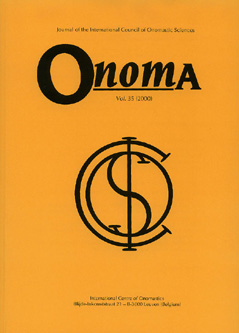 previous article in this issue previous article in this issue | next article in this issue  |

|
Document Details : Title: On Freyr - the 'Lord' or 'the fertile one'? Subtitle: Some Comments on the Discussion of Etymology from the Historian of Religions' Point of View Author(s): SUNDQVIST, Olof Journal: Onoma Volume: 48 Date: 2013 Pages: 11-35 DOI: 10.2143/ONO.48.0.3223612 Abstract : Freyr was probably one of the most important gods in the Late Iron Age North Germanic world. Place-names clearly indicate that he was worshipped in almost all parts of Scandinavia during this period, especially in Norway and Sweden. There is almost consensus that Freyr’s name should be related to Proto Norse *Fraujaz (connected with the IE root *pro- ‘forward, ahead, uppermost, before’) meaning ‘the uppermost’ or ‘Lord’. Probably this is a secondary name construction based on an appellative close related to Goth. frauja ‘Lord’. This name may originally have been a title or a Noa-name of the god. Some scholars have tried to find alternative etymologies to the name Freyr, suggesting, for instance, that it could be related to Old Norse *freyr ‘fertile, germinative, suitable for sowing’, and thus be derived from *Fraiw- and not *Frau-. This etymology would suit a 'fertility god' well, such as Freyr. However, also the other alternative ‘Lord’ is in my opinion compatible with certain functions of Freyr seen in the sources, which rarely have been emphasized in investigations of the god. In this paper it is argued that Freyr was 'more than a fertility god'. Sometimes he carried features of a warrior Lord and appeared as a peace-creator. He was also close related to political power and religious ruler ideology, at least in certain areas of Scandinavia. Thus a name meaning ‘Lord’ is, in my opinion, not out of order. Freyr était probablement un des dieux les plus importants à la fin de l’Âge du fer dans le monde germanique septentrional. Des noms de lieu indiquent clairement qu’il était alors vénéré dans presque toute la Scandinavie, notamment en Norvège et en Suède. Il y a presque consensus sur le fait que son nom viendrait du proto-nordique *FrauiaR (issu de l’i.e. *pro- 'en avant, devant, au-dessus, avant') signifiant 'le plus haut' ou 'seigneur'. C’est probablement un dérivé reposant sur un appellatif étroitement lié au gotique frauja 'seigneur'. Ce nom a probablement été, à l’origine, un titre ou un nom-masque du dieu. Quelques chercheurs ont tenté de lui trouver d’autres étymologies, comme par exemple en lien avec l’ancien nordique *freyr 'fertile, fertilisant, approprié à la semence', et donc dérivé de *Fraiw et non *Frau-. Cette étymologie conviendrait bien à un 'dieu de la fertilité' comme Freyr. Nonobstant, l’alternative 'seigneur' nous paraît compatible avec des fonctions de Freyr rencontrées dans les sources, rarement mises en évidence dans les travaux antérieurs. Nous démontrons ici que Freyr était 'plus qu’un dieu de la fertilité'. Il portait parfois les caractéristiques d’un dieu de la guerre et apparaissait comme un créateur de paix. Au moins dans certaines aires scandinaves, il était aussi lié au pouvoir politique et à l’idéologie souveraine religieuse. C’est pourquoi le sens de 'seigneur' ne nous paraît pas à exclure. Freyr war wohl einer der wichtigsten Götter in der germanischen Welt der späten Eisenzeit. Ortsnamen geben Hinweise auf seine Verehrung in beinahe allen Teilen Skandinaviens in dieser Periode, insbesondere in Norwegen und Schweden. Es herrscht ein fast einstimmiger Konsens darüber, dass sein Name zu protonordischem *FrauiaR (das mit der indogermanischen Wurzel *pro- ‘vorwärts, voran, oberster, vorher’ zusammenhängt) mit der Bedeutung ‘der Oberste’ oder ‘Herr’ in Bezug gesetzt werden soll. Möglicherweise handelt es sich um eine sekundäre Namenkonstruktion, die auf ein Appellativ im Zusammenhang mit gotischem frauja ‘Herr’ zurückgeht. Dieser Name dürfte ursprünglich ein Titel oder Noa-Name des Gottes gewesen sein. Einige Forscher haben den Versuch unternommen, alternative Etymologien des Namens Freyr zu finden, indem sie z.B. die Herkunft von altnordischem *freyr ‘fruchtbar, keimfähig, für die Aussaat geeignet’, abgeleitet von *Fraiw- und nicht *Frau-, in Erwägung gezogen haben. Diese Etymologie erscheint im Fall eines ‘Fruchtbarkeitsgottes’ wie Freyr plausibel. Allerdings dürfte die alternative, selten vorgeschlagene Etymologie ‘Herr’ mit bestimmten Funktionen von Freyr, die aus den Quellen hervorgehen, vereinbar sein. Im vorliegenden Aufsatz wird die These vertreten, dass Freyr mehr als ein Fruchtbarkeitsgott war, denn manchmal wies er Eigenschaften eines Kriegsherrn sowie eines Friedensstifters auf. Er stand ferner im Zusammenhang mit der politischen Macht und Ideologie des religiösen Führers, zumindest in bestimmten Gebieten Skandinaviens. Folglich ist die Deutung ‘Herr’ sehr gut vertretbar. |
|
